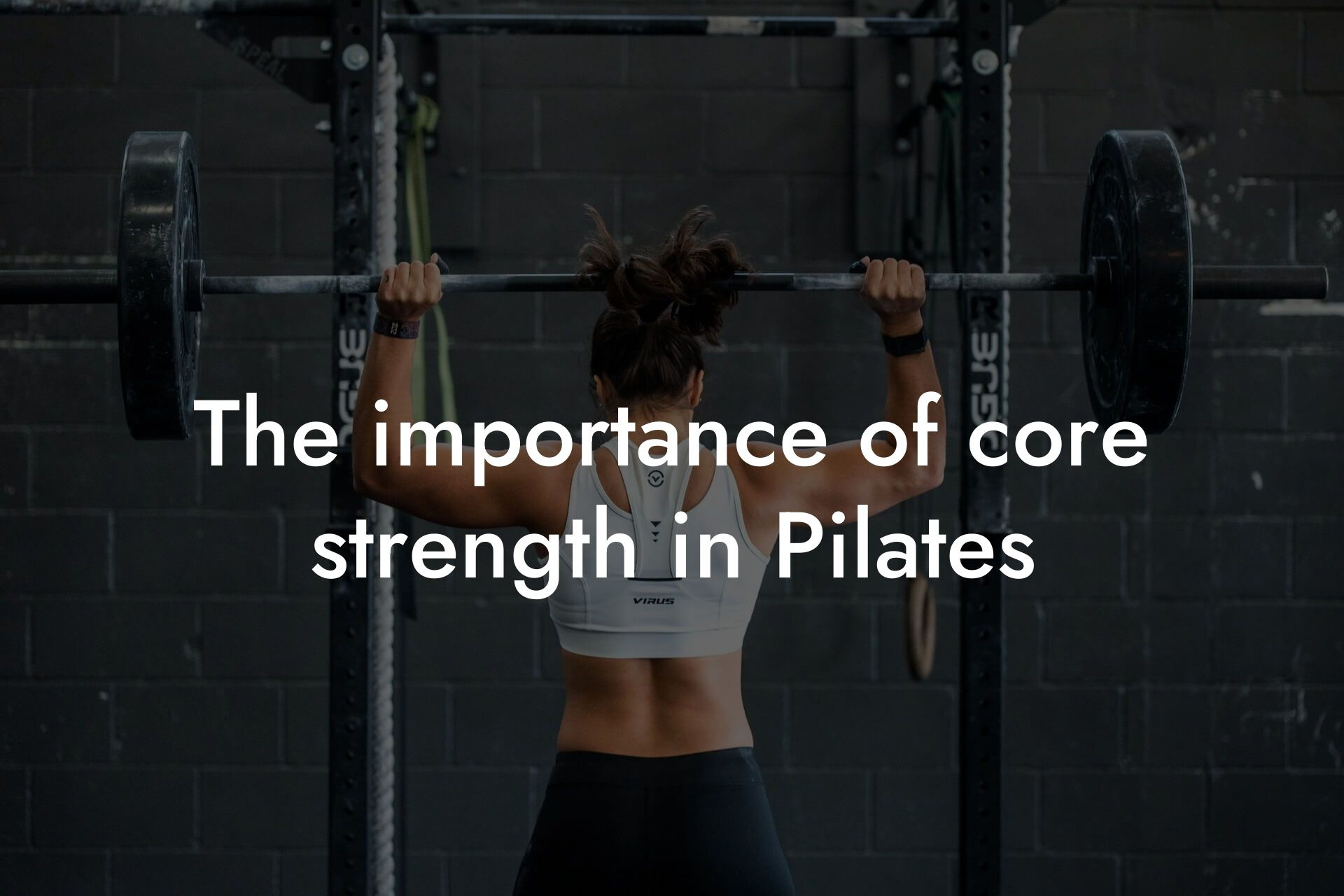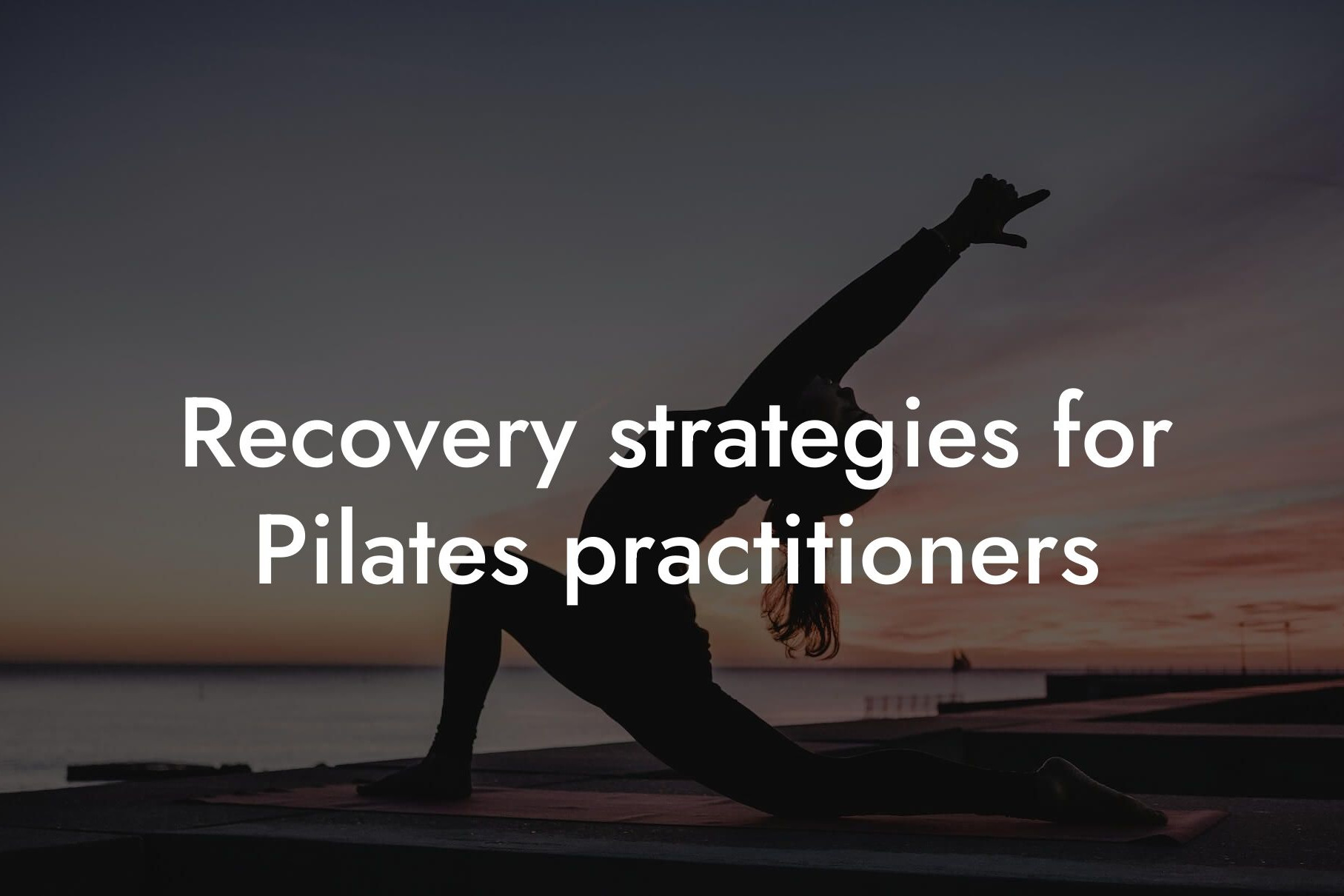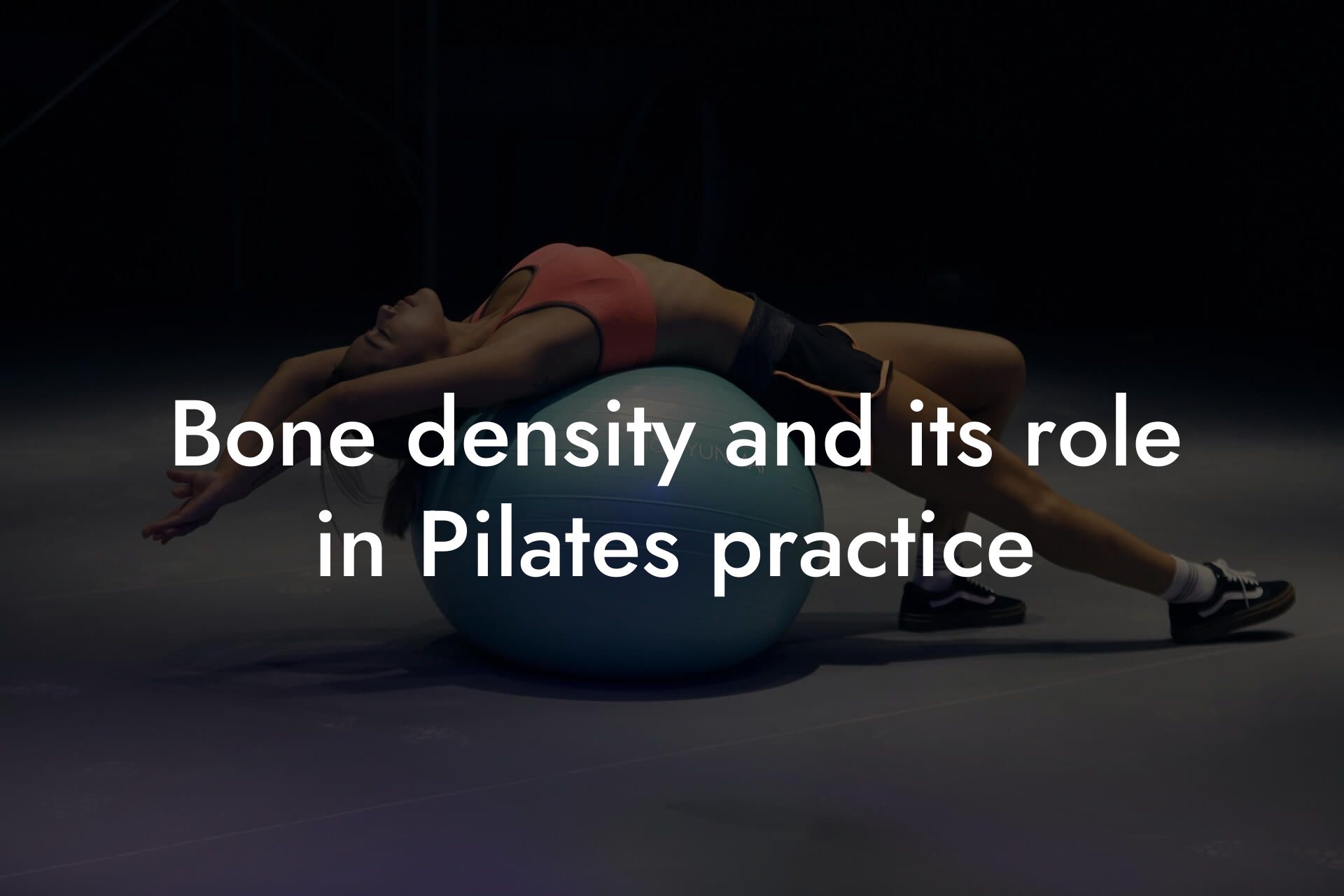As a high-earning professional, you understand the importance of maintaining a healthy and fit physique to stay on top of your game. Pilates is an excellent way to improve your physical appearance, body fat percentage, and bone density. However, to get the most out of your Pilates sessions, you need to fuel your body with the right nutrients. In this article, we'll provide you with expert nutrition tips to maximize your energy levels during Pilates and help you achieve your fitness goals.
Table of Contents
Understanding Your Energy Needs
Before we dive into the nutrition tips, it's essential to understand your energy needs during Pilates. Pilates is a low-impact, high-intensity exercise that requires a combination of strength, flexibility, and endurance. A typical Pilates session can last anywhere from 30 to 60 minutes, and during this time, your body relies heavily on carbohydrates, protein, and healthy fats for energy.
Hydration is Key
Proper hydration is crucial for optimal energy levels during Pilates. Even mild dehydration can cause fatigue, dizziness, and decreased performance. Aim to drink at least 8-10 glasses of water per day, and make sure to drink a glass of water 30 minutes before your Pilates session. You can also consider incorporating electrolyte-rich beverages like coconut water or sports drinks to replenish lost electrolytes.
Carbohydrates: The Primary Energy Source
Carbohydrates are the primary source of energy for your body during Pilates. Focus on complex carbohydrates like whole grains, fruits, and vegetables, which provide sustained energy release. Some excellent carbohydrate-rich foods include brown rice, quinoa, sweet potatoes, and bananas. Aim to consume complex carbohydrates 1-2 hours before your Pilates session to allow for proper digestion.
Protein for Muscle Repair and Recovery
Protein is essential for muscle repair and recovery during Pilates. Aim to consume 15-20 grams of protein 1-2 hours before your Pilates session to help with muscle repair and recovery. Excellent protein sources include lean meats like chicken and turkey, fish, eggs, dairy products, and plant-based options like legumes, nuts, and seeds.
Healthy Fats for Sustained Energy
Healthy fats like nuts, seeds, avocados, and olive oil provide sustained energy release during Pilates. They also help with the absorption of vitamins and minerals. Aim to consume healthy fats 1-2 hours before your Pilates session to provide a slow and steady release of energy.
Pre-Workout Snacks for an Energy Boost
A pre-workout snack can provide an energy boost and help you power through your Pilates session. Aim for a snack that combines complex carbohydrates, protein, and healthy fats. Some excellent pre-workout snack options include:
- Banana with almond butter and honey
- Apple slices with peanut butter and raisins
- Yogurt with berries and granola
- Energy bar with nuts and dried fruits
Avoid Energy-Zapping Foods
Certain foods can zap your energy levels during Pilates, making it challenging to perform at your best. Avoid consuming the following foods 2-3 hours before your Pilates session:
- Processed meats like hot dogs and sausages
- Fried foods like french fries and chicken nuggets
- High-sugar foods like candy and pastries
- Caffeine and energy drinks
Post-Workout Nutrition for Recovery
After your Pilates session, it's essential to refuel your body with the right nutrients to aid in recovery. Aim to consume a balanced meal or snack that combines complex carbohydrates, protein, and healthy fats within 30-60 minutes after your workout. This will help with muscle repair, recovery, and replenish energy stores.
Some excellent post-workout meal options include:
- Grilled chicken with quinoa and steamed vegetables
- Salmon with brown rice and avocado
- Turkey and avocado wrap with mixed greens
- Protein smoothie with banana, spinach, and almond milk
By incorporating these nutrition tips into your Pilates routine, you'll be able to maximize your energy levels, improve your performance, and achieve your fitness goals. Remember to stay hydrated, fuel your body with complex carbohydrates, protein, and healthy fats, and avoid energy-zapping foods. With the right nutrition, you'll be able to take your Pilates sessions to the next level and achieve the physique you've always wanted.
At Tano Performance Group, we understand the importance of nutrition in achieving optimal physical performance. Our DEXA machine provides a comprehensive body assessment, giving you valuable insights into your body composition, bone density, and other key metrics. With this information, you can tailor your nutrition and training plan to achieve your specific fitness goals. Contact us today to learn more about our services and take your physical performance to the next level.
Frequently Asked Questions
What is the importance of nutrition in maximizing energy during Pilates sessions?
Nutrition plays a crucial role in maximizing energy during Pilates sessions. A well-balanced diet provides the necessary fuel for your body to perform at its best, while a poor diet can lead to fatigue, decreased performance, and increased risk of injury. By fueling your body with the right nutrients, you can optimize your energy levels and get the most out of your Pilates sessions.
What are the key nutrients that I should focus on for energy production?
The key nutrients for energy production are carbohydrates, protein, and healthy fats. Carbohydrates provide energy for your muscles, protein helps to build and repair tissues, and healthy fats support hormone production and provide sustained energy. A balanced diet that includes a combination of these nutrients can help to optimize energy production.
How can I ensure that I'm getting enough complex carbohydrates in my diet?
Complex carbohydrates such as whole grains, fruits, and vegetables are rich in fiber, vitamins, and minerals. To ensure that you're getting enough complex carbohydrates, aim to include a variety of whole foods in your diet, such as brown rice, quinoa, whole wheat bread, and a range of colorful fruits and vegetables.
What is the role of protein in energy production during Pilates?
Protein is essential for building and repairing tissues, including muscle tissue. During Pilates, your muscles are working hard to maintain proper form and control, and protein helps to support this process. Aim to include a source of protein in your meals and snacks, such as lean meats, fish, eggs, dairy, and plant-based options like beans and tofu.
How can I incorporate healthy fats into my diet for energy production?
Healthy fats such as avocado, nuts, and seeds provide sustained energy and support hormone production. Include healthy fats in your meals and snacks, such as adding avocado to your omelette or snacking on nuts and seeds.
What are the best pre-workout snacks for energy during Pilates?
The best pre-workout snacks for energy during Pilates are those that combine complex carbohydrates, protein, and healthy fats. Examples include a banana with almond butter, a handful of trail mix with nuts and seeds, or a smoothie with Greek yogurt, berries, and spinach.
How long before my Pilates session should I eat my pre-workout snack?
Aim to eat your pre-workout snack 30-60 minutes before your Pilates session. This allows for digestion and absorption of the nutrients, providing energy and support for your workout.
What are the best post-workout snacks for recovery after Pilates?
The best post-workout snacks for recovery after Pilates are those that combine carbohydrates and protein to help replenish energy stores and support muscle recovery. Examples include a protein smoothie with banana and almond milk, or a handful of dried fruit and nuts with a scoop of protein powder.
How long after my Pilates session should I eat my post-workout snack?
Aim to eat your post-workout snack within 30-60 minutes after your Pilates session. This helps to replenish energy stores and support muscle recovery, reducing muscle soreness and improving overall performance.
What are some common nutritional mistakes that can lead to energy crashes during Pilates?
Common nutritional mistakes that can lead to energy crashes during Pilates include skipping meals, not eating enough complex carbohydrates, and consuming too much sugar or caffeine. These mistakes can lead to energy crashes, fatigue, and decreased performance.
How can I stay hydrated during Pilates sessions?
Staying hydrated during Pilates sessions is crucial for optimal performance. Aim to drink at least 8-10 glasses of water per day, and bring a water bottle with you to your Pilates session. Take regular sips throughout your workout to stay hydrated and support energy production.
What are some electrolyte-rich foods that can help with hydration during Pilates?
Electrolyte-rich foods such as bananas, avocados, and coconut water can help with hydration during Pilates. These foods provide essential electrolytes like potassium, sodium, and magnesium that are lost through sweat and support hydration and energy production.
How can I avoid energy crashes during Pilates sessions?
To avoid energy crashes during Pilates sessions, make sure to eat a balanced meal or snack 1-2 hours before your workout, stay hydrated by drinking plenty of water, and avoid consuming too much sugar or caffeine. Additionally, listen to your body and take regular breaks to rest and recover.
What are some signs that I may not be getting enough nutrients for energy production during Pilates?
Signs that you may not be getting enough nutrients for energy production during Pilates include fatigue, dizziness, lightheadedness, and decreased performance. If you're experiencing these symptoms, it may be a sign that you need to reassess your nutrition plan and make adjustments to support optimal energy production.
How can I customize my nutrition plan to meet my individual needs for Pilates?
To customize your nutrition plan to meet your individual needs for Pilates, consider factors such as your age, sex, weight, and activity level. Additionally, pay attention to how your body responds to different foods and nutrients, and make adjustments accordingly. It may also be helpful to work with a registered dietitian or nutritionist to develop a personalized nutrition plan.
What are some healthy breakfast options that can provide energy for Pilates?
Healthy breakfast options that can provide energy for Pilates include oatmeal with fruit and nuts, scrambled eggs with whole wheat toast, and Greek yogurt with berries and honey. Aim to include a combination of complex carbohydrates, protein, and healthy fats to provide sustained energy.
How can I incorporate Pilates-specific nutrition tips into my daily routine?
To incorporate Pilates-specific nutrition tips into your daily routine, start by making small changes to your diet, such as adding more complex carbohydrates or healthy fats to your meals. Gradually work your way up to making larger changes, such as meal prepping or working with a registered dietitian. Consistency is key, so make nutrition a priority and stick to your plan.
What are some common myths about nutrition and Pilates?
Common myths about nutrition and Pilates include the idea that you need to eat a lot of protein to build muscle, or that you need to cut out all carbohydrates to lose weight. These myths can be detrimental to your performance and overall health, and it's important to separate fact from fiction when it comes to nutrition and Pilates.
How can I stay motivated to make healthy nutrition choices for Pilates?
To stay motivated to make healthy nutrition choices for Pilates, set specific and achievable goals, such as increasing your energy levels or improving your overall performance. Celebrate your successes and don't be too hard on yourself when you make mistakes. Additionally, find a workout buddy or accountability partner to help keep you motivated and on track.
What are some healthy snack options that can provide energy for Pilates?
Healthy snack options that can provide energy for Pilates include fresh fruit, nuts and seeds, energy bars, and trail mix. Aim to choose snacks that are high in complex carbohydrates, protein, and healthy fats to provide sustained energy.
How can I use nutrition to support my overall fitness goals, not just Pilates?
To use nutrition to support your overall fitness goals, focus on making healthy choices that support your overall health and well-being. Aim to eat a balanced diet that includes a variety of whole foods, and make adjustments based on your individual needs and goals. Additionally, stay hydrated, listen to your body, and get enough rest and recovery to support optimal performance.
What are some resources that I can use to learn more about nutrition and Pilates?
Resources that you can use to learn more about nutrition and Pilates include online articles and blogs, books, and registered dietitians or nutritionists. Additionally, consider working with a personal trainer or fitness coach who can provide guidance on nutrition and Pilates.
Here are some related articles you might love...
- The importance of core strength in Pilates
- Recovery strategies for Pilates practitioners
- Bone density and its role in Pilates practice
- How body composition impacts Pilates performance
- Using DEXA scans to optimize Pilates training
- How to integrate Pilates into a balanced fitness routine
- Reducing body fat for improved Pilates results
- Maintaining flexibility and muscle tone with Pilates
- Pilates for injury prevention and rehabilitation
Zak Faulkner
Zak Faulkner is a leading authority in the realm of physical health and body composition analysis, with over 15 years of experience helping professionals optimise their fitness and well-being. As one the experts behind Tano Performance Group, Zak has dedicated his career to providing in-depth, science-backed insights that empower clients to elevate their physical performance and overall health.
With extensive knowledge of DEXA technology, Zak specializes in delivering comprehensive body assessments that offer precise data on body fat, muscle mass, bone density, and overall physique. His expertise enables individuals to make informed decisions and achieve their fitness goals with accuracy and confidence. Zak’s approach is rooted in a deep understanding of human physiology, combined with a passion for helping clients unlock their full potential through personalised strategies.
Over the years, Zak has earned a reputation for his commitment to excellence, precision, and client-focused service. His guidance is trusted by top professionals who demand the best when it comes to their health. Whether advising on fitness programs, nutritional strategies, or long-term wellness plans, Zak Faulkner’s insights are a valuable resource for anyone serious about taking their health and fitness to the next level.
At Tano Performance Group, Zak continues to lead our Content Team revolutionising how professionals approach their physical health, offering unparalleled expertise that drives real results.




